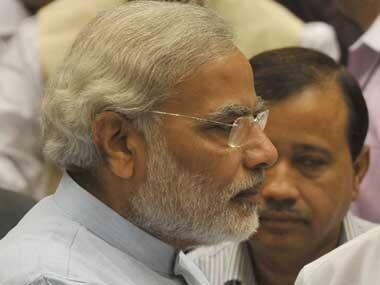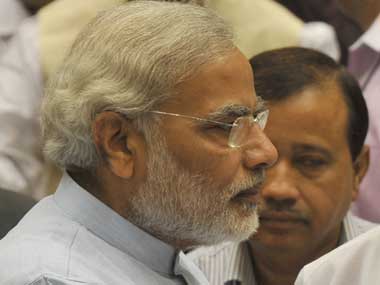As the second and final phase of the Gujarat polls gathers a brisk pace, a BJP leader at the state party headquarters in Khanpur, Ahmedabad, points out an irony: this election is about the RSS. Whoever wins, the Sangh mandarins in Nagpur will have reasons to smile. The reasoning is that three key contenders—Narendra Modi, who is leading the BJP, Keshubhai Patel, who is leading the Gujarat Parivartan Party, and Shankar Singh Vaghela, who is one of the Congress’ leaders—come from the same ideological fountainhead, the Rashtriya Swayamsewak Sangh.[caption id=“attachment_560081” align=“alignleft” width=“380”]
 Gujarat Chief Minister Narendra Modi. PTI[/caption] This argument may sound contrived, but is not without some merit. Modi, the incumbent and hot favourite for scoring a hat-trick, is widely seen as a Hindutva mascot, but the Sangh is worried that he is not amenable to its diktat. He is too popular on his own. Thanks to Modi’s grassroots popularity, the Sangh’s other organisations in Gujarat, like the Vishwa Hindu Parishad, have been bottled up and are seething in anger at Modi. But this is not something unique to the 2012 elections. The situation was almost the same in the last assembly polls in 2007. The debate this time is about how much damage Keshubhai Patel and the Sangh Parivar’s discontents have caused to the Modi bandwagon in the previous phase of polling in Saurashtra, where the Leuva Patel vote is considered crucial. BJP swept Saurashtra-Kutch in 2007. But unlike the first phase, in phase two Modi’s image looms large in central, north and south Gujarat. This is something that Congress leaders at the state party headquarters, Rajiv Gandhi Bhawan, admit rather grudgingly. Keshubhai may have little impact on today’s voting, and Shankar Singh Vaghela is fighting these elections more to keep his personal reputation intact and to have a say in the Congress’ scheme of things in case the voters manage to surprise the pollsters. Modi’s supporters are very hopeful. They believe that whatever “small” losses the BJP may have suffered in Saurashtra will be easily compensated from just two places – Surat and Ahmedabad. After delimitation, one constituency in Surat, Choryiasi, has been converted into seven separate constituencies. The BJP’s victory margin in this seat had earlier been over 2.5 to three lakh. Instead of one, now the victory could extend to seven seats if the BJP margin of last time endures. Similarly, the Sarkhej assembly constituency in Ahmedabad, from where Amit Shah won with a margin of 1.5-2 lakh the last time, has been converted into four seats. The BJP hopes to win all four. The net gain, if it materialises, could be of nine seats apart from the two seats that the party already holds. Ahmedabad district, for instance, has 21 assembly constituencies, 16 of which are urban and five rural. This is the biggest district in terms of the number of assembly seats in the state. The district magistrate, Vijay Nehra, who has previously been awarded by the Election Commission for Best Electoral Practices, told Firstpost that his district has 100 percent photo ID card penetration and even the blind have Braille voting options. This, he believes, will enable higher polling. Nehra, an IIT Mumbai alumnus and former Infosys employee, has used the online medium to the hilt to make the electoral administration more fair and transparent. There is a feeling that the voting percentage will go up from the previous record high of around 71 percent this time. Will this be to the advantage of Modi, and if so, how much, is the key question. Modi’s strategists are banking heavily on first-time (18 years) and young voters below 30 who constitute around 27 percent of the total electorate. Women, they believe, are a strong Modi constituency. But the Congress is dismissive of such simple conclusions. The party believes that the higher voter turnout was an indicator of the people’s eagerness to throw out the incumbent. The BJP uses this factor to claim that Modi’s popularity index is high and this is what the 20 December results will prove. Today is important for the fortunes of two other M’s apart from Modi. While the second phase will decide the extent of Modi’s win (assuming that is the case), in Parliament Mayawati and Mulayam Singh Yadav are slugging it out over the reservations in promotions issue. Mulayam Singh’s staunch opposition to the bill has so far proved futile with the Constitutional Amendment Bill expected to be voted on at 5 pm. Mulayam says he will review his support to UPA-2 should this bill be passed. Mayawati’s position is just the reverse. The final outcome in all these events - voting in Gujarat, and voting on quotas - will impact national politics one way or the other.
Gujarat Chief Minister Narendra Modi. PTI[/caption] This argument may sound contrived, but is not without some merit. Modi, the incumbent and hot favourite for scoring a hat-trick, is widely seen as a Hindutva mascot, but the Sangh is worried that he is not amenable to its diktat. He is too popular on his own. Thanks to Modi’s grassroots popularity, the Sangh’s other organisations in Gujarat, like the Vishwa Hindu Parishad, have been bottled up and are seething in anger at Modi. But this is not something unique to the 2012 elections. The situation was almost the same in the last assembly polls in 2007. The debate this time is about how much damage Keshubhai Patel and the Sangh Parivar’s discontents have caused to the Modi bandwagon in the previous phase of polling in Saurashtra, where the Leuva Patel vote is considered crucial. BJP swept Saurashtra-Kutch in 2007. But unlike the first phase, in phase two Modi’s image looms large in central, north and south Gujarat. This is something that Congress leaders at the state party headquarters, Rajiv Gandhi Bhawan, admit rather grudgingly. Keshubhai may have little impact on today’s voting, and Shankar Singh Vaghela is fighting these elections more to keep his personal reputation intact and to have a say in the Congress’ scheme of things in case the voters manage to surprise the pollsters. Modi’s supporters are very hopeful. They believe that whatever “small” losses the BJP may have suffered in Saurashtra will be easily compensated from just two places – Surat and Ahmedabad. After delimitation, one constituency in Surat, Choryiasi, has been converted into seven separate constituencies. The BJP’s victory margin in this seat had earlier been over 2.5 to three lakh. Instead of one, now the victory could extend to seven seats if the BJP margin of last time endures. Similarly, the Sarkhej assembly constituency in Ahmedabad, from where Amit Shah won with a margin of 1.5-2 lakh the last time, has been converted into four seats. The BJP hopes to win all four. The net gain, if it materialises, could be of nine seats apart from the two seats that the party already holds. Ahmedabad district, for instance, has 21 assembly constituencies, 16 of which are urban and five rural. This is the biggest district in terms of the number of assembly seats in the state. The district magistrate, Vijay Nehra, who has previously been awarded by the Election Commission for Best Electoral Practices, told Firstpost that his district has 100 percent photo ID card penetration and even the blind have Braille voting options. This, he believes, will enable higher polling. Nehra, an IIT Mumbai alumnus and former Infosys employee, has used the online medium to the hilt to make the electoral administration more fair and transparent. There is a feeling that the voting percentage will go up from the previous record high of around 71 percent this time. Will this be to the advantage of Modi, and if so, how much, is the key question. Modi’s strategists are banking heavily on first-time (18 years) and young voters below 30 who constitute around 27 percent of the total electorate. Women, they believe, are a strong Modi constituency. But the Congress is dismissive of such simple conclusions. The party believes that the higher voter turnout was an indicator of the people’s eagerness to throw out the incumbent. The BJP uses this factor to claim that Modi’s popularity index is high and this is what the 20 December results will prove. Today is important for the fortunes of two other M’s apart from Modi. While the second phase will decide the extent of Modi’s win (assuming that is the case), in Parliament Mayawati and Mulayam Singh Yadav are slugging it out over the reservations in promotions issue. Mulayam Singh’s staunch opposition to the bill has so far proved futile with the Constitutional Amendment Bill expected to be voted on at 5 pm. Mulayam says he will review his support to UPA-2 should this bill be passed. Mayawati’s position is just the reverse. The final outcome in all these events - voting in Gujarat, and voting on quotas - will impact national politics one way or the other.
Acid test for 3 Ms today: Modi, Maya, Mulayam
Sanjay Singh
• December 17, 2012, 13:25:45 IST
Today’s second phase of polling in Gujarat is vital for Modi. He has to register a big win to counter possible losses in Saurashtra in phase 1
Advertisement
)
End of Article